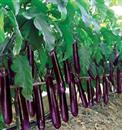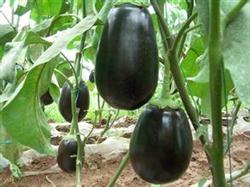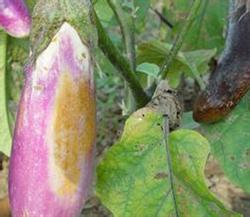Prevention of misunderstandings in cultivation and Management of protected eggplant

In winter, eggplant is cultivated in facilities, and there are still some misunderstandings in the management process of vegetable farmers, which should be improved. Misunderstanding 1: many vegetable farmers think that in the new shed, there are fewer root-knot nematodes and fewer pathogens of Verticillium wilt, Fusarium wilt and bacterial wilt, and high yield can still be obtained without planting grafted eggplant seedlings, but in fact this is not the case. Ungrafted eggplant seedlings planted in the new shed, the temperature rises after the Spring Festival, eggplant withered in a large area, death, or even the phenomenon of extinction is not uncommon, while eggplant grafted with Santos rootstock is more normal, and the yield is high. When planting grafted seedlings, if the grafting is planted too early, it is easy to senescence prematurely, and the yield is low after the year, which affects the income. Misunderstanding 2: heavy application of chemical fertilizer and neglect of organic fertilizer will cause soil hardening, serious salinization, green moss on the surface, serious formation of red moss, hindrance of root development in high concentration soil solution, aging of leaves, poor vegetative growth and decline in yield. This kind of greenhouse should increase the application of organic fertilizer and apply little or no chemical fertilizer to reduce fertilizer damage. Misunderstanding 3: fertilization is single, partial application of nitrogen fertilizer at present, vegetable farmers mainly apply nitrogen fertilizer, while ignoring phosphate fertilizer, potassium fertilizer and micro-fertilizer, resulting in excessive and waste of nitrogen fertilizer, but also easy to cause soil salt obstacles and aggravate the disease. In particular, the approximate proportion of nitrogen, phosphorus and potassium required by eggplant in the fruiting period is 3:1:4, so the extensive use of nitrogen fertilizer in the fruiting period is not in line with the growth law of eggplant. The application of single fertilizer should be avoided and the combined application of nitrogen, phosphorus and potassium should be applied. Misunderstanding 4: the prevention and control of eggplant diseases in improper facilities should be based on prevention, supplemented by treatment, and prevention should be used in advance, which not only has a low cost, but also has a good effect. Some vegetable farmers like the mixed use of a variety of pesticides regardless of the composition of the medicine. in this way, one is that there is a chemical reaction between some chemicals, which reduces the efficacy; second, when the concentration increases, the leaves are often immersed in a high concentration solution, which reduces the function of the leaves and accelerates their aging. reduce photosynthesis.
- Prev

Method for preventing and controlling stiff seedling of greenhouse eggplant
Symptoms: Early spring eggplant often has symptoms such as small leaves, dark green color, thin stems and few roots at seedling stage. After planting, this kind of seedling is slow, weak and easy to drop flowers and fruits. Causes of disease: seedbed temperature is too low (long-term below 15℃) most susceptible to disease, with heating facilities or nutrition bowl seedlings due to large water consumption,...
- Next

How to prevent and cure eggplant cotton blight
Eggplant cotton blight disease, commonly known as rotten fruit and water rot, is one of the important diseases of eggplant, which is common in various places. Eggplant can be harmed at all growth stages. The general loss is 20-30%, and in severe cases, more than 50%. The peak period of the disease is also the peak period of the disease, and disasters often break out in rainy areas and years, resulting in devastating losses. First, disease identification.
Related
- Where is it suitable to grow horseradish in China? it is expected to see the middle altitude horseradish in Alishan.
- How to prevent tomato virus disease reasonably? (Control methods included)
- Many people like to plant towel gourd on the balcony. What are the main points of this method and management?
- What crops can chili peppers be mixed with?
- Fertilization techniques and matters needing attention in Tomato
- What are the grafting techniques for peach seedlings in spring?
- Harm and control methods of root swelling disease of Chinese cabbage
- What are the pests of sweet potatoes? How to prevent and cure it?
- Symptoms, causes and Control methods of navel Rot in Tomato
- The cause of "Cucumber rotten bibcock" in Farmers' planting Cucumber and its Control Plan

